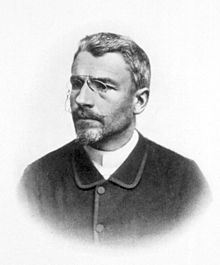Stéphane Leduc

Stéphane Leduc (1 November 1853 – 8 March 1939) was a French biologist who sought to contribute to understanding of the chemical and physical mechanisms of life.[1] He was a scientist in the fledgling field of synthetic biology, particularly in relation to diffusion and osmosis. He was a professor at the École de Médecine de Nantes and worked on osmotic crystallisation and the physiological effects of electric current. He was an Officier de la Légion d'honneur.
Views
[edit]Leduc believed that it is necessary to appreciate biological processes from a physical perspective and constructed models from physics and chemistry to try to explain development and growth; these would typically involve ingenious combinations of chemicals to produce systems which mimicked the appearance of living processes such as karyokinesis and "remarkable fungus-like forms".[1] He "[repudiated] extra-physical forces in the phenomena of life".[1] According to Keller, these models were largely unsuccessful, "not just because of the conspicuous artificiality of his osmotic growths".[1] Leduc sought to synthesise life "by directing the physical forces which are its cause" (in his own words).[1]
See also
[edit]Publications
[edit]- Leduc, Stéphane (1906). Les bases physiques de la vie et la biogenèse. Paris: Masson.
- Leduc, Stéphane (1912). Poinat, A. (ed.). La biologie synthétique, étude de biophysique.
Further reading
[edit]- Works by Stéphane Leduc at Project Gutenberg
- Thompson, D'Arcy Wentworth (1917). On Growth and Form. Cambridge: Cambridge University Press.
- Thuillier, Pierre (1980). Le petit savant illustré. Paris: du Seuil.
References
[edit]- ^ a b c d e Keller, Evelyn Fox (2003). "2. Morphology as a Science of Mechanical Sources". Making Sense of Life: Explaining Biological Development with Models, Metaphors, and Machines. Harvard University Press. pp. 51–55. ISBN 0-674-01250-X. Retrieved 2008-11-06.
